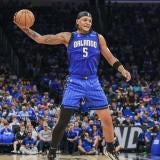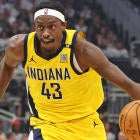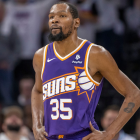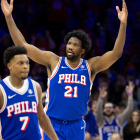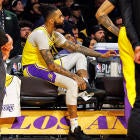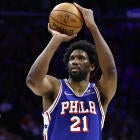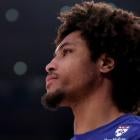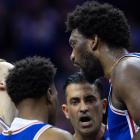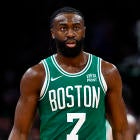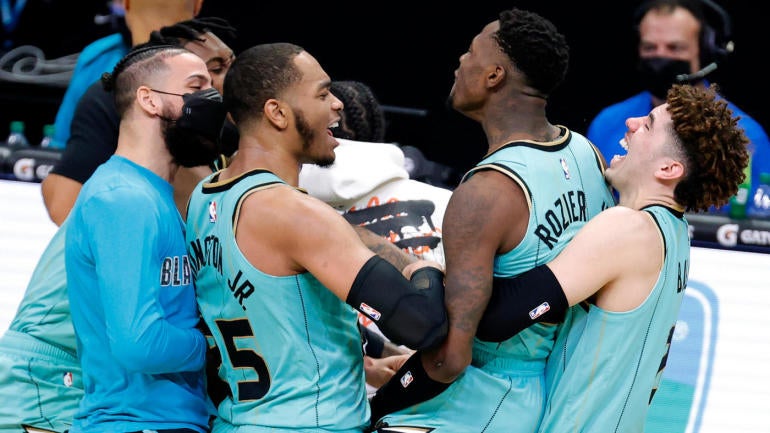
The Charlotte Hornets were in Sacramento, a week into a road trip, coming off a loss to the Golden State Warriors in which Draymond Green had recorded 19 assists and Kelly Oubre Jr. had dunked six times in the first quarter. They'd battled to the end, but it was not their finest defensive performance.
They had three games in four nights ahead of them. After that, a brief respite: The All-Star break. The frenzied schedule afforded them little opportunity to blow off steam.
"Can't leave your room," Hornets coach James Borrego said. "There's not a whole lot to do. You can't really get outside and enjoy the city or have a meal."
Playing an NBA season in a pandemic requires players and coaches to get their meals to go and to tolerate solitude. They're tested all the time. Different types of tests. Literally, figuratively. For Borrego, it can be a mental challenge, although he doesn't show it when he's around the team. "He's super encouraging," center Cody Zeller said, a vital attribute for the coach of a young team, now more than ever. On this particular Sunday, though, Borrego wasn't as chipper as he'd have preferred. And he had a morning meeting to lead.
"We walk in and you could feel the weight," Borrego said. "Everybody's a little tired and unsure of what the day would bring us."
Then 19-year-old rookie LaMelo Ball emerged youthfully. "He's skipping along and high-fiving people and cracking jokes," Borrego said. If you happen to be in a room when Ball enters it, he will dap you up and ask how you're doing, no matter who you are. Serious basketball people talk about his smile and his court vision with the same reverence. "He's got a hop in his step," team president Mitch Kupchak said. "He lights up the room when he walks in the room."
The energy changed. All season, it has been like this. Whenever Borrego's spirits need lifting, the team provides a boost. "There's joy in the building," he said, every time the Hornets have a walkthrough, a film session or, when the schedule lines up just right, an actual practice.
Good vibes did not prevent them from falling behind by 14 points in about five minutes that night. They might, however, account for Charlotte sticking with it, with three of its top players -- Gordon Hayward, Devonte' Graham and Zeller -- sidelined. The game appeared all but over when Borrego called timeout down eight points with 73 seconds left, the Kings celebrating an emphatic dunk by Harrison Barnes.
The comeback started the way most do not: With a turnover and a flagrant foul. But De'Aaron Fox bonked a pair of free throws, part of a string of six straight Sacramento misses from the line, and from there the Hornets could do no wrong. Ball blocked Marvin Bagley III from behind, Terry Rozier hit a transition 3 and Barnes fouled Rozier behind the line. P.J. Washington knocked down a 3 to give him a career-high 42 points. Malik Monk finished through contact and converted a three-point play for the win.
"I felt so bad for Luke Walton," Kupchak said.
Sympathetic as he was to his fellow former Laker, the 66-year-old basketball lifer was satisfied that his young Hornets had played to the end. Kupchak believes that this gives the Basketball Gods time to change the course of the game.
"That just shows the fight in this team," forward Miles Bridges said. "I really still to this day don't know how we pulled that game off."
Delirious in victory, Bridges yelled, "That's how you steal a win!" Borrego rolled up a stat sheet and brandished it like a broadsword as he addressed his band of thieves in the locker room: "You never the drop the sword. Looks like this thing is dead in the water, we've done this how many times? Multiple times. Over and over."
Among the many charms of the 2020-21 Charlotte Hornets is their resilience. Now, they're going to need more of it. On Saturday, in the second quarter against the Los Angeles Clippers, Ball deflected a pass, attacked the rim and fell on his right hand. The severity of the injury wasn't apparent when he popped up three seconds later and walked to the free throw line. He played seven third-quarter minutes with a wrap on his wrist and threw a couple of left-handed hit-ahead passes.
An MRI the next day in San Antonio revealed a fractured right wrist. Initial reports indicated that Ball would miss the Hornets' final 31 games. The team announced he would be reevaluated in four weeks after having surgery on Tuesday, though ESPN is still reporting that his season is likely over.
Every fractured bone, torn ligament and muscle strain is its own small tragedy. Betrayed by the bodies on which their careers depend, the injured are separated from their teammates and forced into monotonous rehab until they are injured no longer. Ball's injury is the rare one that also devastates symbolically. While other teams are clearly trudging through a nightmarish season, Hornets games can give off the impression that they exist in a parallel, pandemic-free universe, joyfully alley-ooping their way around the country, the Rookie of the Year frontrunner leading the way.
On the phone last Tuesday morning, I asked Hayward what he'll remember about his first season in Charlotte, where the team appears to be having a blast despite, well, everything. He was at Spectrum Center, the Hornets' arena, where he was required to take a COVID-19 test before 9 o'clock.
Hayward recalled that he had about 10 days to get to Charlotte after having what felt like 24 hours to decide where he wanted to spend the next few years of his life. For the first month of the season, he lived in a hotel. League restrictions and an abridged training camp made it virtually impossible to get to know his teammates.
"And for whatever reason, I think we've all jelled together," Hayward said. "Like you said, it looks like we're having fun. We are having fun. We do have fun out on the court. I think a lot of that has to do with our style of play."
As a free agent, the Hornets sold him on an offense based on ball movement, spacing and tempo. "That's all held true," he said. There are always multiple creators on the court, and the coaching staff preaches the "point-five" philosophy Borrego lived for the 10 years that he spent working for the San Antonio Spurs: When you catch the ball, you have a half-second to drive, pass or shoot.
Charlotte may have concealed the arduousness of the season more than any team in the NBA, but it hasn't avoided it. "There certainly are days when you're not feeling like you necessarily want to play basketball," Hayward said. The Hornets are just good at minimizing them.
"I have my days sometimes," Bridges said. "You're getting tested two, three times a day, we're locked inside a hotel room on the road, so, yeah. Some people come by my room. Melo, he comes by my room all the time, plays a game with me. Terry, he comes by, we'll watch a show or something. Everybody checks on everybody."
Bridges said he considers it his job to "make sure that everybody's mental is OK." He then credited Ball, Rozier, Graham, Washington and Hayward for bringing positive energy.
Ebullient center Bismack Biyombo is also a unifying force. "He makes sure that the group is never down," Borrego said.
The Hornets have a "very collegiate-type feel" that is "hard to find in our league," Borrego said. Hours after the miracle in Sacramento, assistant coach Jay Triano strutted into their morning meeting in Portland dressed as Rozier, wearing a sleeveless teal Hornets practice shirt over a sleeveless gray hoodie and a long sleeve black undershirt, with a pair of black basketball shorts over black tights. Triano walked up to a TV displaying a photo of Rozier in a similar outfit, so the team could have a side-by-side comparison.
"We have fun, and I think it's easier to coach that way," Triano said. "It's easier to be around people that way. And the way this schedule is right now, you better be connected. Because it's crazy. It's game after game and travel after travel."
Graham has considered what all of this would be like on a team that doesn't get along. "I think that would be miserable," he said.
The Hornets hired Borrego and Kupchak in 2018. That summer, Charlotte's scrimmages featured a 12-second shot clock to encourage quick decision-making. The plan then was to make the offense less dependent on Kemba Walker, their franchise point guard, and they signed the 36-year-old Tony Parker to ease his burden. A year later Walker left, Parker retired and the franchise pivoted to rebuild mode.
There was little buzz around the team last season. Slowly, though, the Hornets began to reflect Borrego's values, and their development program had a number of success stories. Graham, previously their third-string point guard, took the league by complete surprise as a lead playmaker wielding a deadly pull-up 3. Rozier, acquired in the wildly unpopular sign-and-trade that sent Walker to Boston, thrived on a healthy diet of spot-up 3s. Washington, a rookie, looked like he belonged from Day 1. Charlotte ranked fourth in assist percentage and fourth in passes per game, which is around where they are this season. They finished 23-42, but went 7-6 in the 13 games that preceded the hiatus.
"The last month of the season, I started to see a group that was competitive, that was together, that was resilient, and we were playing some good basketball," Borrego said.
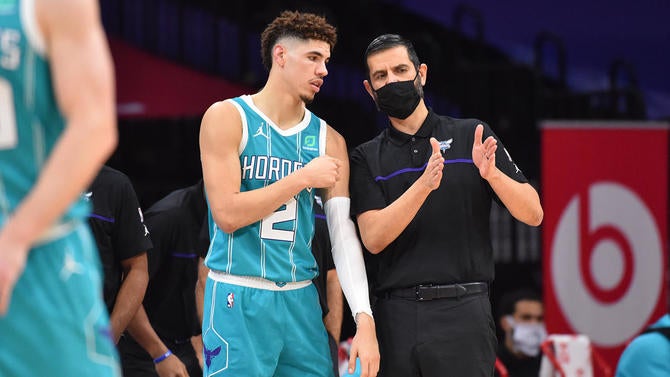
If the Hornets were irrelevant then, they were invisible last September. As members of the Delete Eight, as nicknamed by The Athletic's John Hollinger, they hadn't played a game in more than six months.
Bridges estimates that, before the season stopped, he'd never gone more than two weeks without organized basketball. "It was kind of weird for us," he said. He felt lucky to be able to spend time with his son and newborn daughter, who "kept my mind off not playing." When he watched the NBA restart, though, he was jealous.
To make up for their exclusion from the bubble in Florida, they were permitted to host an in-market bubble. When Jamal Murray sealed a win in Game 3 of the Western Conference finals with a deep 3 over Anthony Davis, the Hornets' players and coaches were watching over dinner from The Lodge At Ballantyne, where they'd checked in the previous day for the NBA's version of a corporate retreat.
The next day, they scrimmaged for an hour at their practice facility and watched Game 4 of the Eastern Conference finals at night. That left plenty of time for team bonding: Tennis, golf, table tennis, intense games of Monopoly.
Some players were apprehensive, but they came around. Rozier golfed for the first time and talked trash about his table tennis prowess. Twins Cody and Caleb Martin celebrated their 25th birthday with the team.
"We had so much fun in that bubble," Triano said, comparing it to his years playing for and coaching the Canadian national team: "You had to spend time with everybody. Like, you're overseas, it's breakfast, lunch and dinner are all eating together. You really become part of a family."
For the coaching staff, this would come in handy later. "We joke, we laugh," Triano said. "I think in the first year, it was tough. It was tough to put a clip on there of a player doing something silly in a game. But now it's like, oh, man, we gotta put that on the edit there." The in-market bubble, he believes, played an important role in making this possible.
"You can get on them when they don't do the right thing, and they're willing recipients," Triano said. "I think the first year, they're looking at us like, 'Who are you? What do you mean you're telling me this? Why would you embarrass me in front of my teammates?' Whereas now they know us."
The day of the Hornets' first September scrimmage, Hayward FaceTimed with his wife, Robyn, from Disney World. She was in the delivery room. He had originally planned to be there for the birth of his son, but plans changed when he hurt his right ankle in the first game of the playoffs. Hayward went home to Indianapolis to rehab, then rejoined the Celtics. The Hornets watched him play that night.
Training camp commenced in Charlotte on Dec. 4. "Everything was thrown off with COVID," Hayward said. Two-a-days were off-limits. Borrego's coaching staff had two new, high-usage playmakers, a lot to cover, and quickly. "There was a lot of information coming at me," Hayward said, and he felt like he had just left Orlando. Complicating matters further, since he was under the impression that the season would start late January at the earliest, he'd undergone minor surgery on his left foot after the bubble.
"I'm still trying to recover from this minor surgery," Hayward said. "Well, everyone else on their team has been itchy to play. Certainly the coaching staff, the players, they have all been ready to go. So that was another dynamic that was different."
Ball stood out from the start. Hayward's first thought was that his new, highly touted teammate was taller than he looked in highlights. Then they started playing, and "he was definitely, like, all over the place on the court," Hayward said. "There were some good things, there were some bad things, but it was like this energy about him where you're just like, man, this kid is all over the place here, impacting the game in different ways."
Borrego knew that the Hornets had a chance to take a step forward. In a speech to the team, he said that nobody on the outside expected much of them. He wanted to address how the previous season had ended and set the tone for what they were about to go through. Monk was not there because he had tested positive for COVID-19.
"It's been a grueling year on everybody in this league," Borrego said. "And not only our league but throughout the world. Everybody's having some serious mental, financial, physical issues. What I've tried to share with our guys is, from Day 1, we get to play basketball, we get to play a sport, we're healthy, we're tested. There's a lot to be grateful for in this season."
Bridges said that the pandemic "opened a lot of our eyes because basketball was taken from us for a long period of time." For the returning Hornets, he said, there's an "extra boost when we go out there." They remember Borrego urging them to relish the opportunity to come together as a team, to entertain people and to play the game they love.
"It's people out here who are going through real traumatic things," Graham said. "Basketball is just -- it's something that you do for fun. It's not a life-or-death thing. If we lose, we don't die."
The Hornets may have been instilled with a sense of purpose all season, but it wasn't apparent right away. In the opener Ball went scoreless and Zeller broke his hand. After seven games they were 2-5, with the league's 25th-ranked offense, coming off three double-digit losses in four days: one to the Grizzlies at home, two in Philadelphia.
The second Sixers loss was a wake-up call. "We all looked at each other, like, look, we don't want to be another average team again," Bridges said. "We want to be a team that everybody's worried about and that everybody's talking about." The goal was the playoffs.
Hayward said the message was simple: "We don't want our season to start spiraling down like this." He also said he thought they'd be fine, they just happened to run into a Sixers team that was playing at an extremely high level. Triano expressed the same sentiment at a coaches' meeting.
Charlotte ran off four straight wins after that. Against Atlanta, Hayward had 44 points, the most he'd scored in his life, relieving the pressure the team was feeling in the most aggressive possible way. Against New Orleans, in their only nationally televised game of the first half of the season, he scored 22 of his 26 points after halftime.
"We can't underestimate what Gordon's brought to this team," Triano said. "Here's a guy that's getting paid max dollars, and he comes in here and wants to be treated the same as everybody else. And he works harder than everybody else. He's over there for shootaround on an optional shoot day. He's working on his game. I don't think we can underestimate the professionalism that he brought to this group of guys as well. It's not like he came in here demanding all this shit."
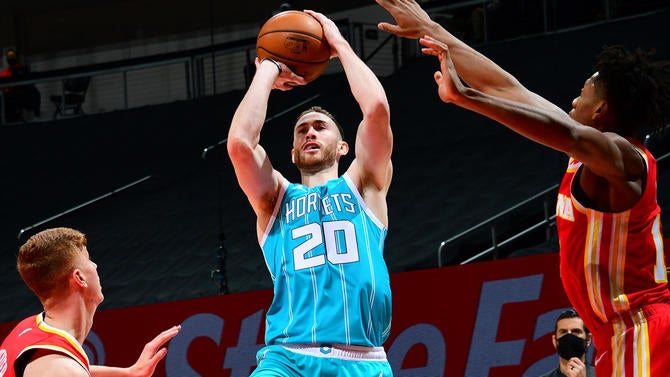
Ball should have made history in the Pelicans game, but finished one assist shy of a triple-double because he didn't get credit for a pass he made after falling to the floor trying to split two defenders. Instead, he became the youngest player ever to record a triple-double the following night, in another win over the Hawks.
"You never know what to expect with him," said Bridges, his favorite alley-oop target. "You gotta be on your Ps and Qs when you're in the game with Melo. 'Cause he'll find you. That's why I run the floor so hard: Because he's not scared to throw the ball. He has trust that I'll catch it and finish. He's a special point guard. He makes everybody on the team happy. And he can score the ball at will, too. I feel like that's what's so dangerous about him."
Ball supercharged the Hornets' transition game, and Hayward allowed them to seamlessly flow from one action to the next in the halfcourt. In a more basic sense, the new guys are the two most talented players on the team.
"We're definitely better than we were in the last 2K," Bridges said.
Around that time, on The Ringer's "Group Chat" podcast, I went bananas over a one-legged midrange jumper that Ball had cashed over the Hawks' Kevin Huerter. For about 45 minutes, four dudes babbled on about why we were into this 6-5 team that, a week earlier, hardly anyone was taking seriously.
None of us said, "Hornets hive, assemble!" But it would not have been inappropriate.
We weren't positive that this was a playoff team. As far as League Pass teams go, though, Charlotte checks every box. There are young players with freedom to improvise and an inclination to run, but the vets complement them and the offense has structure. Catching the highlights is cool, but hearing play-by-play announcer Eric Collins call them live is glorious.
"I could make a sweet little bounce pass, and he'll act like I made a game-winner," Bridges said. "His announcing is funny. I love it."
Recently, social media accounts for ESPN's "SportsCenter" posted some of Collins' wildest calls. Bridges sent it to the team group chat.
"Everybody was laughing," he said. "Everybody loves the energy that he brings to announce the game. And I feel like that matches our energy on the court."
Collins is a self-described "competition junkie." He doesn't scream at the top of his lungs because of the Hornets any more than Bridges dunks violently because of Ball. ("Ever since I started dunking, I've just always dunked hard," Bridges said. "I don't know where it comes from. It's probably 'cause I got big hands, I don't know.") In both cases, however, we would be lucky if they stayed together forever.
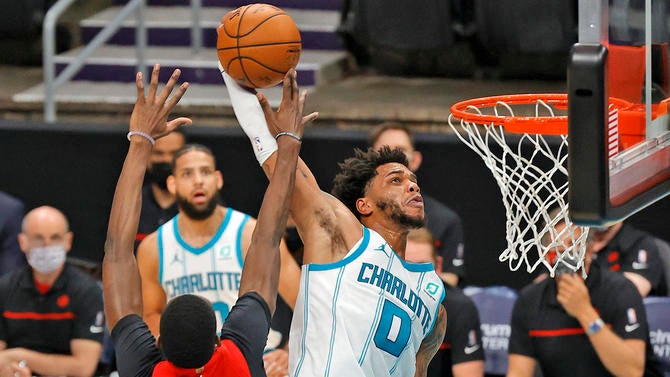
Collins is not active on social media. For the first half of the season, Charlotte played its home games without fans. He sensed the excitement, however, from his daughters.
"They're going to school now on a limited basis, every couple of days throughout the course of a week," he said. "And they come back home and they're like, 'Oh my God, Dad, oh my God, Dad, can you get access to LaMelo Ball? Can you give this to LaMelo? Can you find out this about LaMelo?' And that's all they want to talk about. And it seems as if my daughters are getting more and more popular just because everyone thinks that they're going to be the easy access to get into Spectrum Center and get tickets at some point."
To Collins, it is an "absolute godsend" that, after the Hornets were fortunate enough to turn their break-up with Walker into Rozier, "who has just been all that and a bag of chips, man," they were able to complete the rebound by landing the third pick in the draft, where Ball fell in their lap. After "kind of banging their head against the wall for so many years," the franchise was due for some good luck. He described Ball as "transcendent," the kind of player that elevates an organization and everyone around it.
"Before the game, we're talking 90 minutes before the game, he comes out to do his little warmup routine and the guys who are mopping the floor just stop and watch the guy," Collins said. "It's like watching Mark McGwire take batting practice. Just watching him dribble the basketball and stretch, people are excited, man. He's just got this magnetism to him. It's undeniable. We're no longer on the floor, we're broadcasting from up at the concourse level, but still it's must-see TV. I'm gaga over just him when he's tying his shoelaces. I'm sure I'd be fascinated to watch him brush his teeth."
The respect is mutual. "I feel like a lot of people should be like that," Ball said. "A lot of energy. It just, obviously, makes it way funner to watch and everything like that. He's great."
The Hornets have consistently blessed Collins with comebacks, close games and crunch-time heroics worthy of a full-throated "HUM DIDDLY DEE!" The special part, to him, is that it's not just one guy handling the ball in high-pressure situations.
Hayward made a game-winner in Orlando to complete a fourth-quarter rally. Monk erupted for 36 points, including the 3 that forced overtime, when they beat the Heat on the road. Rozier not only made a contested, buzzer-beating, off-the-dribble 2 in the left corner to beat Golden State, he scored 20 points in the fourth quarter and 10 in the final 78 seconds. If one image captures Charlotte's season, it is Ball lifting Rozier in the air from behind, before a swarm of Hornets collapse on top of each other, as Steve Kerr kicks the ball in disgust.
It is difficult to measure crunch-time confidence and the effect of being unpredictable at the end of games, but clutch stats provide a decent starting point. When ahead or behind by five points or fewer in the final five minutes, the Hornets have a net rating of plus-53.4. In the 25 years that the league has tracked such things, no team has come close to this level of domination. They're 14-5 in these situations, and they're 16-0 when entering the fourth quarter with a lead.
The numbers are particularly striking because of Charlotte's recent history. In each of the two seasons that preceded Borrego's hiring, the Hornets underperformed their point differential more than all but one team in the NBA, according to Cleaning The Glass. In those two years they went a combined 38-54 in clutch situations. As self-assured as Walker was in crunch time, there was only so much he could do.
"He was one of the better players I've seen down the stretch, the last six minutes," Zeller said. "But every team knew that it was going to be in his hands and he was going to take every shot. Teams could kind of game-plan for that."
Zeller is in his eighth season in Charlotte, the only player who has been with the Hornets since they were the Bobcats. "I feel like the old guy," the 28-year-old said. (Biyombo, another 28-year-old former Bobcat, took a three-year detour then came home.) Clutch stats are small samples -- this year's are based on 58 total minutes -- but, to Zeller, it feels different now. It felt different last year, too, when Charlotte had the second-best offense and fifth-best net rating in the clutch.
"We've had some good luck," Zeller said. "Sometimes, it is how it bounces. But I think we've had enough data over one or two seasons that at some point you can't give all the credit to luck. I think we have guys that aren't afraid of the big moment. A lot of different guys that can step up and make plays. Whatever we're doing seems to work."
At the halfway point of the season, Kupchak was wary. The Hornets' performance had been encouraging, but there would be nothing resembling a victory lap about the Ball pick, the $120 million Hayward contract or anything else. The furthest he'd go is to say that "a couple of things are more advanced than we thought" and that having a chance to make the playoffs with young players is a satisfying position to be in.
"A team is a very fragile thing," he said. "And it doesn't take much to upset the apple cart."
It remains to be seen how Charlotte will fare in Ball's absence. Seasons have turned on much less. This front office, however, is unlikely to steer off course. To Kupchak, this season has always been about "getting young players closer, through playing time, to who they're really going to end up being." Yes, he gave an enormous, long-term deal to a guy who turned 31 this week, but the point was to create a competitive environment. Kupchak believes that being in the hunt makes teams play with passion, facilitates development and helps management evaluate the roster.
"I don't know where we're going to end up," Kupchak said. "I want to see growth in all our young players. I want to get a really good feel for what we have here going forward. We have decisions we have to make during the offseason. I think we're getting some answers during the season. We're gathering information."
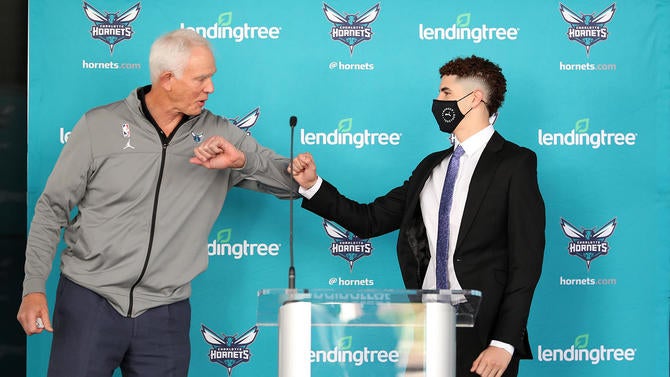
Entering the second half, he wanted to see how Ball would handle going through the league a second time, against defenses increasingly designed to make him uncomfortable. He'll have to wait for that, but the rest of his questions -- how the Hornets handle a schedule that gets brutal before it gets easier, whether or not they improve defensively and on the glass -- will be answered.
Kupchak has "been around too long," he said, to get ahead of himself. "I've seen too much." He laughed at the idea of overreacting to his team hovering around the .500 mark. "Personally, I think we're fun to watch," he said. But expectations will change.
"Until we're 10 to 15 games above .500, then, yeah, maybe I'll feel even better, but then something else will crawl into my brain and take over," Kupchak said. "Right? That's how it is in this business. Even if you win a championship, as soon as it's over, you feel pressure to repeat. You don't really get a chance to say it's all said and done.
"Now, I am much closer to the end than I am to the beginning, so maybe at some point I will be able to really enjoy it -- on a personal level, enjoy the accomplishment of winning something really substantial here in Charlotte. That would be my hope. But the reality is that we're just not there yet."
Ball only played two games in front of fans at Spectrum Center before the injury. The first was a wire-to-wire win over the Raptors, in which the first thing paying customers saw was a 25-4 run by the home team, playing the kind of basketball that it had been building toward all year, that kind that Ball described as "beautiful to play and beautiful to watch."
In the third quarter of that game, Washington intercepted a pass, went behind his back to start the break and found Ball open in the corner. In that moment the Hornets could have been any pace-and-space team, or even the Showtime Lakers. In the next, they were something entirely original. Ball pump-faked, and, as Norman Powell flew by, he opened his bag of tricks and grabbed something at random: A spin move, followed by one dribble and a quick-release 3 over Kyle Lowry.
Asked what went through his mind on the play, Borrego went silent.
"I'm not sure at times," he said, eventually. "I don't know. I mean, we don't teach that one in our program. I don't know where he learned it from. But if it goes in, I just clap my hands and I say, you know, 'Let's go play some good defense.'"
On some level, writing about Ball is like dancing about architecture. If his genius can't be explained, it obviously cannot be replaced. "He's really turned our franchise in a very positive way," Borrego said on a Zoom call on Monday. "So I'm hurt for him. I'm devastated for him."
Pre-draft concerns about his jumper and his willingness to take contact have been put to rest. If his rookie season is over, he will finish it having started one more game than he came off the bench. In seven weeks as a starter he averaged 19.5 points, 6.2 assists, 5.8 rebounds and 1.7 steals in 32.1 minutes, with .464/0.426/.811 shooting splits and a 26.2 percent usage rate.
At his age, those are superstar stats. Ball has the kind of talent that can change a team's trajectory. It's not always easy, however, to blend that talent into an existing framework, and that is what's happened here.
"Until you have someone in-house, you never know," Borrego said. "You need know how their teammates are going to react to them. You never know how they're going to interact with their teammates. I didn't know if this was going to be The LaMelo Show and everything was going to have to run through him and he thought everything was going to run through him. I didn't know what to expect when we got together. But from Day 1 we said as a group we're going to do this together."
Without Ball, the league is less interesting, to say nothing of the Hornets. Initially, Borrego didn't even let himself think about the possibility that Ball's injury was more than a minor sprain. When he got word on Sunday, though, he allowed himself only a brief pity party. "I don't want to go to our guys and explain this," he said on Zoom. "But that's just the reality of it. This is life." Borrego had a conversation with Ball, and Rozier and Bridges spent the day with him. "If it was up to him, he'd play left-handed," Rozier said, as if Ball hadn't done just that in Los Angeles.
In Charlotte's first game since the injury, it couldn't sustain the kind of flow it has at its best. The Hornets fought, though, and Rozier supplied every big shot they needed to eke out a tough win against the Spurs, end a three-game slide and climb back to .500. Borrego couldn't have been more proud.
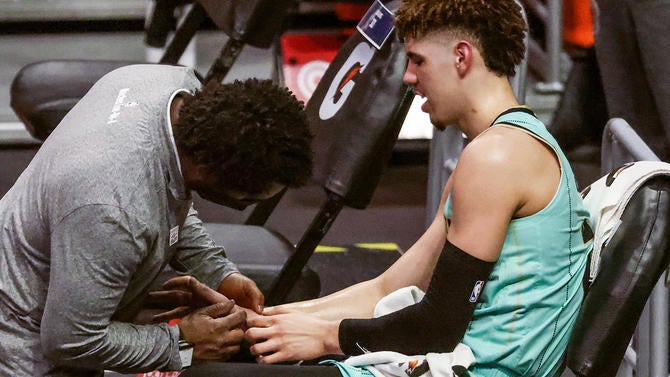
If there is any reason to believe that the Hornets can stay steady without Ball, it is that they chose not to reorient the entire franchise around him. They might have to become more of a halfcourt team, but Borrego hopes they can continue to push the pace. Ball's usage will be split between four more-than-capable creators, and Monk will get more minutes. Their starting backcourt, Graham and Rozier, is the same as it was for the first 20 games and almost all of last season. Charlotte needs to do a better job when it comes to containing the ball, protecting the paint and getting back in transition, but the coaches were emphasizing all of that anyway.
Already, the Hornets have eclipsed expectations, demanded attention and earned respect, with the camaraderie and poise of a team that has been together much longer. "More than anything, I feel like this group wants more," Borrego said. "I think they're hungry. I think they've tasted some success now and when you have that taste you want more of it." You never drop the sword.
Regardless of how long Ball is sidelined and whether or not the Hornets make the playoffs, this season has shown who they are. "To me, this is a defining cultural moment for our organization," Borrego said. "This is how we play. This is why we're attractive." The mission is to build something that lasts.
"I don't want this to go away," Borrego said. "I want our fans, I want the NBA, I want players when they watch us and coaches when they watch us to see a joy and a togetherness when they watch us play. And I don't know where it's going to go from here, but I do believe it's sustainable. And this is just a fun way to play basketball. It's a fun way to come to work every day."







